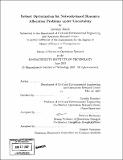Robust optimization for network-based resource allocation problems under uncertainty
Author(s)
Marla, Lavanya
DownloadFull printable version (5.476Mb)
Other Contributors
Massachusetts Institute of Technology. Operations Research Center.
Advisor
Cynthia Barnhart.
Terms of use
Metadata
Show full item recordAbstract
We consider large-scale, network-based, resource allocation problems under uncertainty, with specific focus on the class of problems referred to as multi-commodity flow problems with time-windows. These problems are at the core of many network-based resource allocation problems. Inherent data uncertainty in the problem guarantees that deterministic optimal solutions are rarely, if ever, executed. Our work examines methods of proactive planning, that is, robust plan generation to protect against future uncertainty. By modeling uncertainties in data corresponding to service times, resource availability, supplies and demands, we can generate solutions that are more robust operationally, that is, more likely to be executed or easier to repair when disrupted. The challenges are the following: approaches to achieve robustness 1) can be extremely problem-specific and not general; 2) suffer from issues of tractability; or 3) have unrealistic data requirements. We propose in this work a modeling and algorithmic framework that addresses the above challenges. (cont.) Our modeling framework involves a decomposition scheme that separates problems involving multi-commodity flows with time-windows into routing (that is, a routing master problem) and scheduling modules (that is, a scheduling sub-problem), and uses an iterative scheme to provide feedback between the two modules, both of which are more tractable than the integrated model. The master problem has the structure of a multi-commodity flow problem and the sub-problem is a set of network flow problems. This decomposition allows us to capture uncertainty while maintaining tractability. Uncertainty is captured in part by the master problem and in part by the sub-problem. In addition to solving problems under uncertainty, our decomposition scheme can also be used to solve large-scale resource allocation problems without uncertainty. As proof-of-concept, we apply our approach to a vehicle routing and scheduling problem and compare its solutions to those of other robust optimization approaches. Finally, we propose a framework to extend our robust, decomposition approach to the more complex problem of network design.
Description
Thesis (S.M.)--Massachusetts Institute of Technology, Dept. of Civil and Environmental Engineering; and, (S.M.)--Massachusetts Institute of Technology, Sloan School of Management, Operations Research Center, 2007. Includes bibliographical references (p. 129-131).
Date issued
2007Department
Massachusetts Institute of Technology. Department of Civil and Environmental Engineering; Massachusetts Institute of Technology. Operations Research Center; Sloan School of ManagementPublisher
Massachusetts Institute of Technology
Keywords
Civil and Environmental Engineering., Operations Research Center.